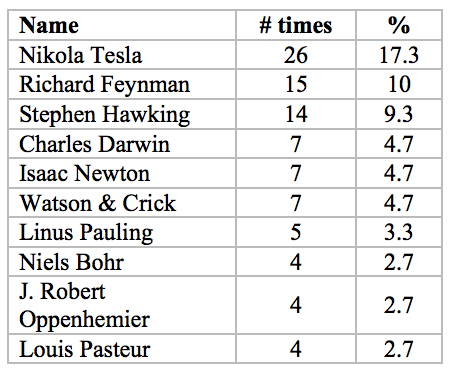

I asked readers to spontaneously name just one scientist, and I received 204 responses. Nine of the individuals named were not scientists; that left 195 responses out of 204, indicating that 96% of those who responded could name a scientist. In stark contrast, 23% of adults in the USA Today poll could not name a single scientist. This result is not surprising – readers of science blogs probably have a higher understanding of the subject compared with the general population.
Who are the most frequently named scientists in my informal poll? Of the 195 individuals who correctly responded, 45 named more than one scientist. To simplify data analysis, I considered only the first scientist mentioned by these individuals, leaving 150 responses for scrutiny. Here are the top 10 scientists named in the poll:


I was surprised at the amazing diversity of scientists selected. Four scientists were each named three times (Dawkins, Einstein, Galilei, Heisenberg), 12 were named twice (Dirac, Earle, Faraday, Franklin, Carver, Kaku, Leeuwenhoek, Nye, Plait, Planck, Turing, Tyson, Racaniello), and 56 scientists were named once. In all, 82 different scientists were identified by 150 respondents. Even more scientists were listed by the 45 other individuals who gave more than one name.
One reader asked if anyone could name female scientists. Unfortunately none made the top-ten list above, and only 9 of the 82 different scientists were women – Marie Curie, Rachel Carson, Sylvia Earle, Dian Fossey, Virginia E. Johnson, Ada Lovelace, Mary-Claire King, Barbara McClintock, and Doris Taylor. A dozen more female scientists were identified by those individuals who listed more than one person.
I draw a few conclusions from this very informal poll: first, the readers of virology blog are familiar with a very broad range of scientists; and second, awareness of the contributions of female scientists could be improved. But the real issue is the gulf between my readers and those who responded to the USA Today survey. How can we reach those individuals to teach them some science?

Is the lack of non-Europeans/Americans to be expected then? Admittedly, Im not too sure I could do better then what I did, but it does seem odd doesn't it? I think the oldest one on your list is Leeuwenhoek, and yet science existed for 1500 years before him.
It makes we wonder what your survey would yield if done in Cairo, Bombay, Beijing or Tokyo.
One of Ronald Reagan's biggest mistakes was trying to abolish the Department of Education. This sent a clear signal that he did not comprehend that education was actually an urgent national security issue.
Let's expand the frame. My bet is that the median Japanese high school student would be able to name more Nobel Laureates in the sciences than the median here at this blog. I may be mistaken; there are lots of brilliant people here, but the Japanese school system produce kids that can think.
And it isn't just rote thinking. On a per capita basis, far more patents are awarded to Japanese than American applicants, a sign of creative thinking.
We have an extremely serious problem. We need to get out of our endless self-congratulation that we are the envy of the world.
We are not. We need to get organized, turn off the television and study.
And then study some more.
From http://www.abc.net.au/rn/scienceshow/stories/20…
“We had a great experience in Korea. Korea has these very good science high schools. We were there to do a presentation at one in Daejeon, and anyway we showed a picture of Barry Marshall and asked, 'How many people know this famous Australian?' And probably two-thirds of them were shouting out who it was. We put up a picture of Kylie Minogue and said, 'Who knows this famous Australian?' No-one.”
I have no idea how Barry Marshall looks like, but I know he proved Helicobacter pylori are the cause of most stomach ulcers (by drinking a suspension of it).
I am not sure if I would be able to recognize Kylie Minogue on a picture, but I guess there is a good chance that I would.
And since nine years I live and work in Korea, including two years in Daejeon.
I agree that a greater awareness of women in science should be realized in such polls and on TWIV but we cannot turn a blind eye to African American males’ and other minorities’ roles in science, past and present.
With regret, I'm guilty of not knowing many female scientists (other than the notable few mentioned in your post). In one of my enzymology lectures when we were learning about Michaelis-Menten kinetics, it came as a suprise to learn that Menten was in fact a woman. Taught me a valuable lesson to never assume that equations, bodies, processes etc will always be named after a male.
With regret, I'm guilty of not knowing many female scientists (other than the notable few mentioned in your post). In one of my enzymology lectures when we were learning about Michaelis-Menten kinetics, it came as a suprise to learn that Menten was in fact a woman. Taught me a valuable lesson to never assume that equations, bodies, processes etc will always be named after a male.